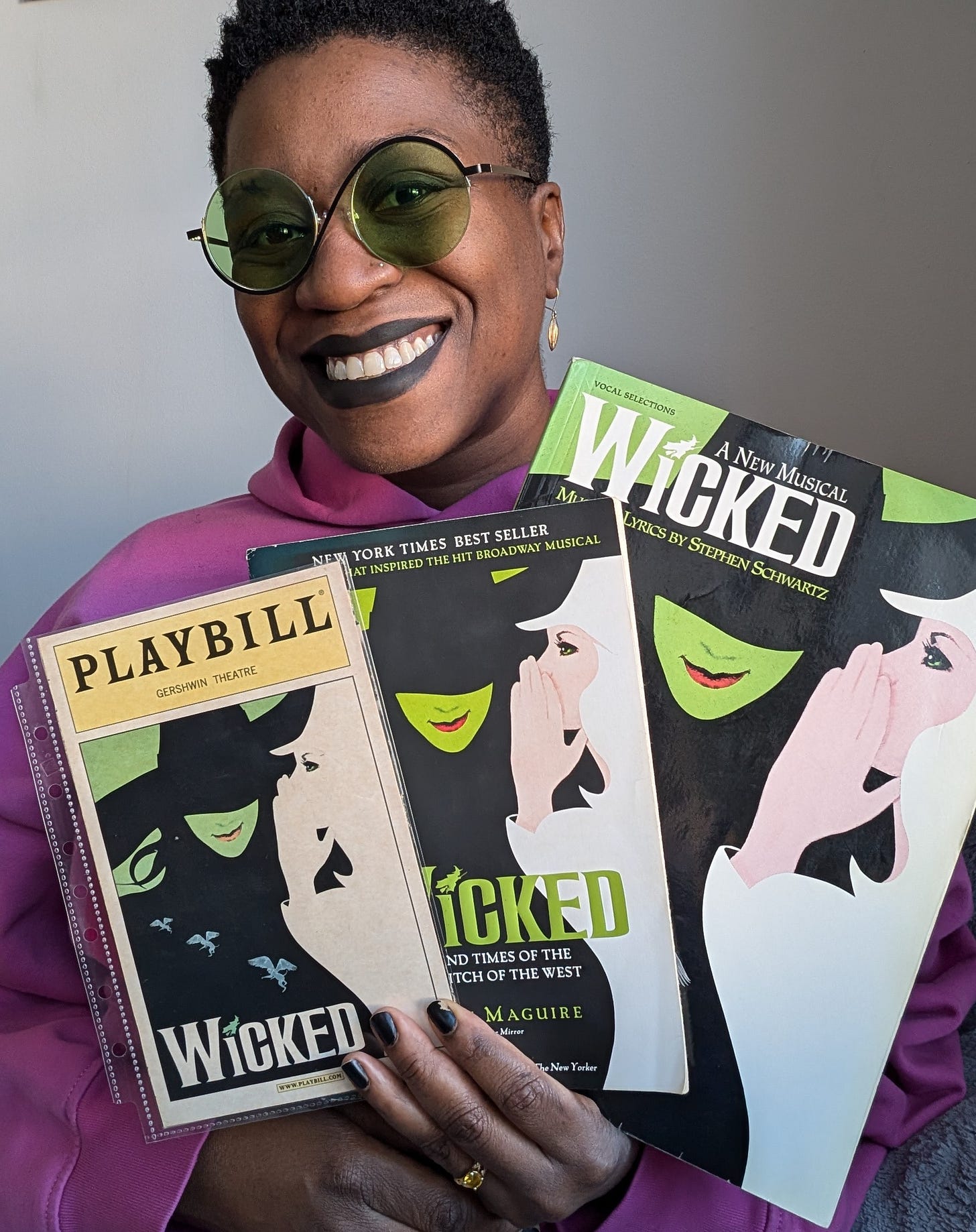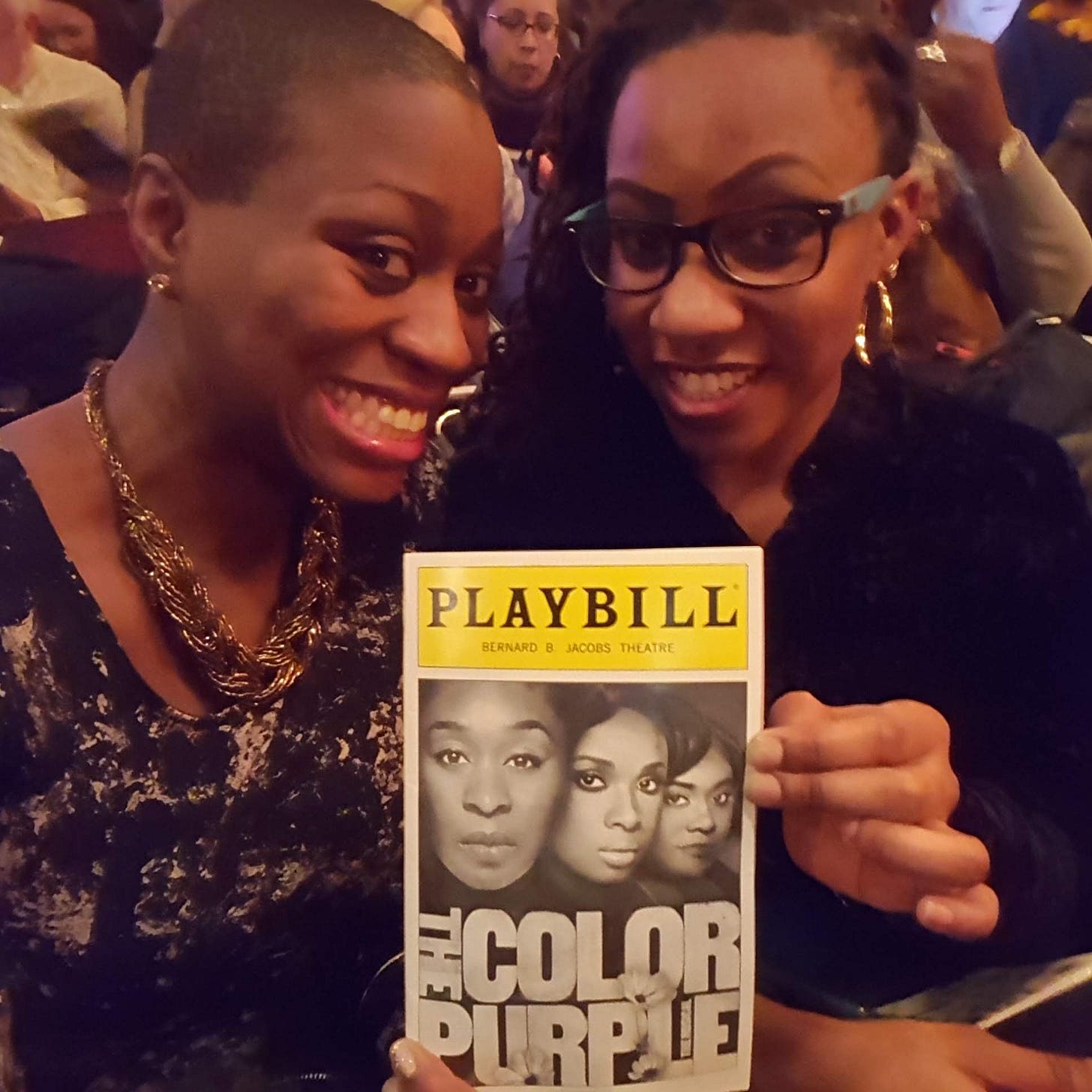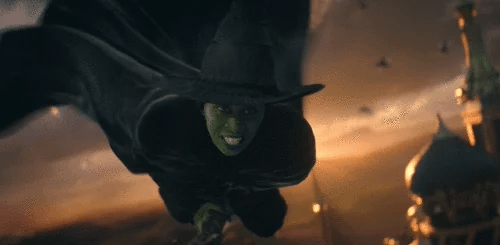Hi y’all,
Listen, I apologize in advance, but I HAVE to talk about Wicked.
Let’s set the stage.
I probably still had bubble ties in my braids (iykyk) when I graduated from kiddie theater to shows on “The Great White Way” (yup).
It was a big deal– I’d seen musicals before, but these were official Broadway productions. To whoever ran that program giving kids a half-priced birthday discount– I have a stack of Playbill covers to thank you for.
I’d give out my own pretend Tony Awards to shows I’d seen. The Scarlet Pimpernel won “Best Set” for its sliding guillotine. Saturday Night Fever won “Best Curtain Call” for the sharpest dance canon I’ve ever seen. And Aida won “Best Musical” because Heather. Headley.
Musical theater has been my happy place for decades. Every original cast recording stretched my vocal and emotional range. Every step of choreography in the living room expanded my sense of presence. Every costume and set taught me the value of environmental context.
All this to say, I’m a theater kid.
Say what you want about musical theater, something magical happens when songs drive major plot points. It is an undeniably powerful art form.
Little Nia was all about the spectacle of it– the bright lights, the elaborate costumes, the impressive dancing, the catchy songs. But as I grew older, I came to appreciate musical theater’s capacity to examine profound philosophical themes. It’s fun, but it’s also very serious. One minute you’re free as a bird singing about living hills and laughing brooks, the next, you’re performing in stirring protest against Nazis.
As an art, musical theater examines human connection on both emotional and socio-political scales. It moves you. Sometimes, literally.
I could go on forever about shows that present the audience with highly nuanced questions of good, evil, and individual agency in the face of it all. Seriously, DM me if you’re really looking to geek out.
In the meantime, here’s a list of other shows that feel fit for these times. As you listen to the cast recordings (or watch the movie version!) ask yourself– How are you moved? How will you act?
Hadestown
Cabaret
The Wiz
Hamilton
Into The Woods
But back to Wicked.
I can’t tell y’all how many times I’ve sung Defying Gravity. From a high-school castmate’s couch to college talent shows to a piano bar cabaret last month– I’ve belted out that final battle cry for over 20 years. It’s amazing to now hear the song casually blasting from passing cars with a Black woman’s voice.
I’ve been so lucky. The first original cast recording I cared to learn back-to-front starred a dark-skinned, crop-haired leading lady who was also a Trini. I’ve always been able to see my own human experience– including my Blackness– in musicals.
I’ve also been lucky enough to see Cynthia Erivo perform live. There are quite literally no words to describe what happened in that theater, but I’ll try– it was like she generated some kind of surge of energy in every person there. She sang and we all shot to our feet. I’ve seen a lot of standing ovations. This is the only one I can remember in my body.
All this to say, this specific woman… playing this specific role… at this specific time… is exceptional in every sense of the word.
Defying Gravity is a song about tapping into your power. When Cynthia Erivo sings it, it deepens into a pressing call to action–
Do your work, even when it’s hard.
Stop pretending you don’t know what that work is.
Give allies a chance to come with you, but don’t limit yourself for them.
Defying Gravity is also a song about questioning the balance of power. When Elphaba sings it, she’s challenging all laws that create unjust limits, including those of physics itself.
It’s not just a song of self-actualization, it’s a song of collective actualization. It’s a timely musical reminder that stepping into your power is necessary, not just for one person, but for us all.
If you haven’t seen the movie yet, I’m here to tell you that all the hype does not disappoint. My little musical theater heart is so full. I couldn’t be happier (😉) that so many people have connected to this masterpiece.
How are you moved? How will you act?
A few years ago, I learned that Maslow’s Hierarchy of Needs is actually incomplete. Apparently Abraham Maslow spent six weeks with the Siksika (Blackfoot) Nation years before publishing his theory.
“He intended to test the universality of his theory that social hierarchies are maintained by dominance of some people over others. However, he did not see the quest for dominance in Blackfoot society. Instead, he discovered astounding levels of cooperation, minimal inequality, restorative justice, full bellies, and high levels of life satisfaction. He estimated that “80–90% of the Blackfoot tribe had a quality of self-esteem that was only found in 5–10% of his own population” The Blackfoot Wisdom that Inspired Maslow’s Hierarchy
Human needs are not a pyramid that peaks at self-actualization. Instead, the Blackfoot philosophy expands to community-actualization and the cultural-actualization that can only happen through future generations.
Human needs haven’t really changed that much over time and space. We still need food and shelter. We still need a sense of belonging. We still need each other.
It is clear that we need systems to change. But no one can change the world alone. And real collaboration is hard.
This is not how it was “supposed” to be. And it is not how it has to be. Millions of Americans could strengthen democracy by practising it… Many are out of practice at coming together, committing to one another in pursuit of a shared purpose, deliberating together, deciding together, and acting together—the essential practices of democracy in its most everyday form. The same goes for skills related to group decision making, managing internal conflict, or holding one another accountable—the most basic democratic practices. We see, hear, and read about the major threats to democracy every day, but a closer look reveals the depth of the challenges we face in our everyday lives. Will Trump Teach Us To Care About Democracy Again?
What Marshall Ganz calls the “practice of democracy,” I call collaboration. At its core, collaboration is connecting on purpose, for a purpose. It is both a skill and a strategy, and it is necessary for any kind of meaningful systems change in the face of technological advancement, political disorder, and socio-economic instability. No matter what, we’re going to have to be able to work together for the work ahead.
Next Friday (12/13) I’m presenting a free webinar on collaboration: “Why Now & How: Breaking Down Silos to Collaborate for Systems Change.” Whether you’re reflecting on your individual impact or finalizing your team’s strategic action plans, this session will help you explore:
What does collaboration look like in practice? What are the components of this “soft” skill?
Why is collaboration required for effective systems change in the years ahead?
How does this apply to your work in 2025 and beyond?
All are welcome to join regardless of field or level of experience. Click here to register!
Wicked energy is carrying me into 2025. You can find me learning new vocal runs and helping changemakers break down silos. Some things I cannot change, but ‘til I try I’ll never know. 🧹🪄
Let’s fly from silos to ecosystems,
Nia







